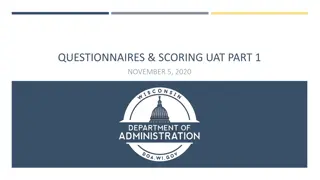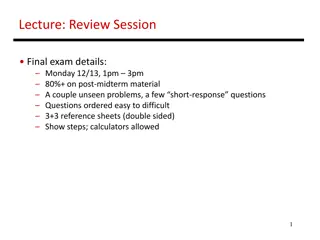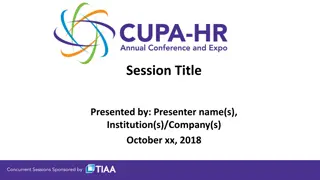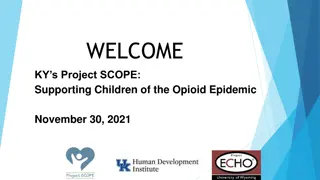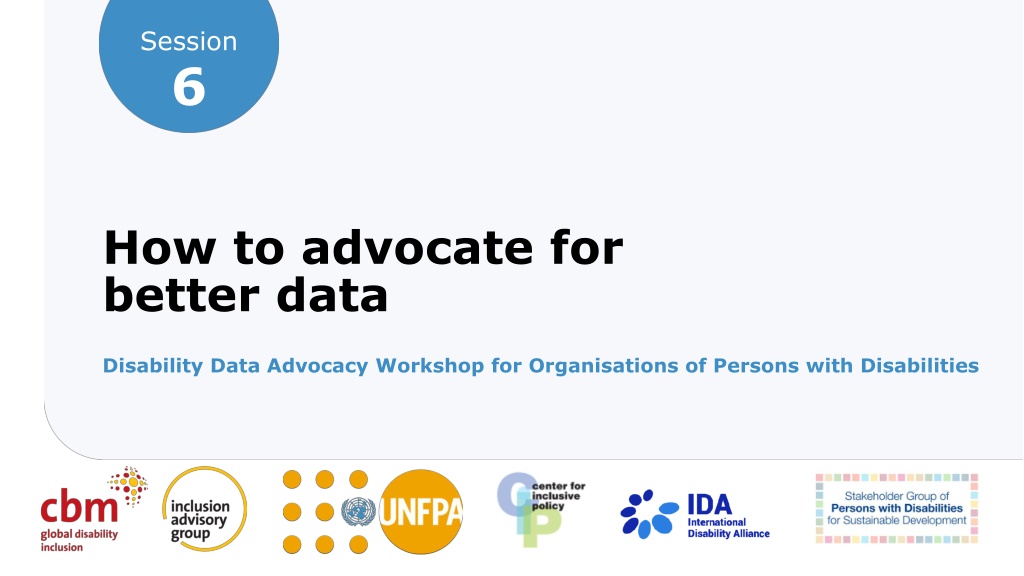
Advocating for Better Disability Data: Workshop Insights
Discover how to advocate for improved disability data collection by leveraging the CRPD and SDGs frameworks. Uncover the gaps in disability data, understand data collection requirements, and learn strategies to address attitudinal barriers and lack of political will regarding disability data.
Uploaded on | 0 Views
Download Presentation

Please find below an Image/Link to download the presentation.
The content on the website is provided AS IS for your information and personal use only. It may not be sold, licensed, or shared on other websites without obtaining consent from the author. If you encounter any issues during the download, it is possible that the publisher has removed the file from their server.
You are allowed to download the files provided on this website for personal or commercial use, subject to the condition that they are used lawfully. All files are the property of their respective owners.
The content on the website is provided AS IS for your information and personal use only. It may not be sold, licensed, or shared on other websites without obtaining consent from the author.
E N D
Presentation Transcript
Session 6 How to advocate for better data Disability Data Advocacy Workshop for Organisations of Persons with Disabilities
Session overview 2 Disability Data Advocacy Workshop for Organisations of Persons with Disabilities SESSION 6
Overview of session This session will: Examine what data is required to monitor global frameworks, as to determine when this data is missing; and Develop a plan to advocate for better data using the CRPD and the SDGs. 3 Disability Data Advocacy Workshop for Organisations of Persons with Disabilities SESSION 6
How to advocate for better data 4 Disability Data Advocacy Workshop for Organisations of Persons with Disabilities SESSION 6
Data collection requirements CRPD requirements: CRPD Article 31 requires States Parties to collect data on persons with disabilities. CRPD Article 3 General Principles. CRPD Article 4.3 requires that States Parties shall closely consult with and actively involve persons with disabilities, including children with disabilities, through their representative organisations. 2030 Agenda (SDGs) requirements: The SDGs include 231 global indicators, of which 11 are specifically disability inclusive. The SDGs also include a general recommendation for countries to disaggregate by disability: see 2030 Agenda paragraphs 48 and 57, and Goal 17.18. 5 Disability Data Advocacy Workshop for Organisations of Persons with Disabilities SESSION 6
Disaggregation helps us determine whether we are meeting the CRPD and SDG objectives equally If bars are at an equal height, then we have met the objectives of equality and inclusion. Proportion employed (%) 90 60 If bars are not at an equal height, we have not met the objectives and more work needs to be done to address inequality. 30 0 Personswithout disabilities disabilities Personswithout Personswith disabilities disabilities Personswith 6 Disability Data Advocacy Workshop for Organisations of Persons with Disabilities SESSION 6
Why are there disability data gaps? Attitudinal barriers from officials at all levels. Lack of disability training and awareness amongst NSOs. Lack of political will of governments. Disability data can get lost since disability data is spread across several government departments. Solution: NSOs need increased capacity, awareness training, and support to collect disability data. Resources exist to support this. Ministries need to demand disability data is collected across ministries. The CRPD and SDGs can be useful frameworks for advocating for better data collection. 7 Disability Data Advocacy Workshop for Organisations of Persons with Disabilities SESSION 6
CRPD implementation and data collection What is your government doing to collect data as obligated by the CRPD? Ask the National Statistics Office for data on persons with disabilities. Query the types of data collected or disaggregated by disability in line with CRPD and the global SDG indicator framework. Query how data files are disseminated and what reports are produced as part of a series or as special reports. Review government-funded research institutions to learn if they are publishing reports that include data on persons with disabilities. 8 Disability Data Advocacy Workshop for Organisations of Persons with Disabilities SESSION 5
CRPD reports and data Do CRPD reports include data? Check if data is included in the government report to the CRPD committee as well as shadow reports done by OPDs. Follow CRPD committee discussions on your country s report and if there are recommendations included on disability data. Formulate advocacy messages using the recommendations by the CRPD Committee on data and other related areas. 9 Disability Data Advocacy Workshop for Organisations of Persons with Disabilities SESSION 5
Example of CRPD recommendation to improve data collection - Australia CRPD Report: There is an absence of national data disaggregated by disability at all stages of the of the criminal justice system, including data on the number of persons 'unfit to plead' who are committed to custody in prison and other facilities. CRPD committee recommendation to address this gap: Collect data disaggregated by disability, age, gender, location, and ethnicity at all stages of the criminal justice system, including on the number of persons unfit to plead who are committed to custody in prison and other facilities. Advocacy message: Disaggregated data on disability, age, gender, location, and ethnicity are important for understanding the population of persons with disabilities held in custody. 10 Disability Data Advocacy Workshop for Organisations of Persons with Disabilities SESSION 5
Data and SDG implementation There is a lack of internationally comparable disability data to measure the SDGs. Many countries are not collecting data: At the appropriate time interval. To meet accepted standards of quality. To provide adequate information to monitor CRPD and SDG implementation. The lack of (comparable) data increases marginalisation and subsequent failure by governments to address the barriers and discrimination encountered by persons with disabilities. 11 Disability Data Advocacy Workshop for Organisations of Persons with Disabilities SESSION 5
Citizen-generated data Citizen-generated data is increasingly being recognised as a complement to official statistics to measure progress of those most left behind in the SDGs. Citizen-generated or community-driven data is defined as data that individuals, communities, or their organisations, produce to directly monitor, demand, or drive change on issues that affect them. The Leave No One Behind (LNOB) Partnership highlights how civil society organisations are working to promote the recognition of community-driven data in monitoring and influencing for positive change. 12 Disability Data Advocacy Workshop for Organisations of Persons with Disabilities SESSION 6
Advocating for better data in the Pacific The Pacific Disability Forum shares the following lessons around disability data advocacy: Use the CRPD and SDGs to drive advocacy messages on why disability disaggregated data is important. Carry out joint analytical processes that strengthen commitments to disability inclusion from government stakeholders. Form good partnerships with the organisations undertaking the work. Have a long-term view. Continue advocating for the collection of other information in population surveys. For more information refer to the case study in the Disability Data Advocacy Toolkit. 13 Disability Data Advocacy Workshop for Organisations of Persons with Disabilities SESSION 6
How to advocate for better data using the CRPD and the SDGs 14 Disability Data Advocacy Workshop for Organisations of Persons with Disabilities SESSION 6
Activity What key gaps in disability data exist in your country? Draw on learning from previous sessions as well as this one, such as considering: 1.Are there formal data and other sources? 2.Can the population of persons with disabilities be identified? 3.Are persons with disabilities being equally included in efforts toward the SDGs (e.g., equal employment or education rates)? 4.If not, is there any information or data pointing to howpersons with disabilities are being left behind, or the barriers causing this? 5.What is the quality and the sources of data? 6.What questions do data sources use to identify persons with disabilities, and are there any limitations to these questions? 7.What can be and is disaggregated? 8.How does this relate to the primary concerns and priorities of your OPD members (e.g., employment)? 15 Disability Data Advocacy Workshop for Organisations of Persons with Disabilities SESSION 6
Summary of key points The CRPD and the 2030 Agenda mandate countries to collect and disaggregate disability data, yet significant data gaps remain that affect achieving full CRPD and SDG implementation. Lack of data on persons with disabilities increases marginalisation and the government then fails to address the barriers and discrimination encountered by persons with disabilities. Citizen-generated data is increasingly being recognised as a complement to official statistics. 16 Disability Data Advocacy Workshop for Organisations of Persons with Disabilities SESSION 5
End of session Please complete Individual Reflection Sheets for this session 17 Disability Data Advocacy Workshop for Organisations of Persons with Disabilities SESSION 6









